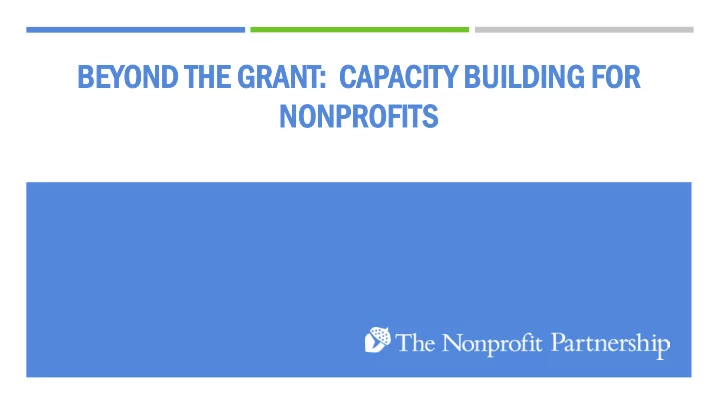

BEYOND T ND THE G GRANT NT: : CAPACIT ITY B BUILDIN DING F FOR NO NONPR NPROFITS
GOALS FOR TODAY What is Capacity Building? How Do We Do Capacity Building? How Do You Address Capacity Building? Discuss Real Capacity Needs of Nonprofits Advancing Partnerships with the Nonprofit Sector to Build Capacity
WHAT IS CAPACITY BUILDING? The focus is on effectiveness. It is an investment and a process. The three c’s: Contextual, Continuous, Collaborative. Creates a foundation to innovatively address the most important issues and challenges we face. Other?
THE NONPROFIT PARTNERSHIP Our mission is to enhance the management and governance of regional nonprofit organizations through capacity-building programs and services. Begun in 2001 as a program of the Erie Community Foundation. Established as a separate 501c(3) in 2006 360 member organizations
HOW WE DO IT Host educ ducational wo workshops ps an and d seminars.
HOW WE DO IT Inten ensiv ive e Trainin ings
HOW WE DO IT Profess ssional Fo Foru rums
HOW WE DO IT Other r Program amming ng Foundation Center Fridays Canva Catchall Bring Your Own By-Laws (BYOB)
HOW WE DO IT Outre reac ach Nonprofit Help Desk
HOW WE DO IT Communi unicati ations: ons: Nonprofit Insider (2,704 Subscribers) Website/Blog/Job Board (1,593 monthly visitors) Original Content (eBooks, blog articles, educational videos)
HOW WE DO IT Cons nsul ultati ations: ons: Executive Transition Succession Planning Board Governance Board and Fundraising Fundraising Planning CEO Evaluation Strategy Emergency Planning Policy/Procedure Development Board Retreats CEO Coaching
HOW WE DO IT Annual Conference Nonpr nprofit D Day 20 2019 October 29, 2019 Keynoters: Lynne Wester and Jay Wilkinson Advanced Tracks: Fundraising and Leadership
HOW WE DO IT Locati ation: on: • Susan Hirt Hagen Center for Transformational Philanthropy • Erie Community Foundation campus
HOW WE DO IT Annua nnual Day y of of Gi Givi ving: Er Erie Gi Give ves
HOW WE DO IT Whe here We Are Goi Going: • Being a champion for the sector. • Building and supporting collaboration. • Intensive learning and support.
HOW WE DO IT Erie rie Communi unity Found ndat ation on and NPP rela relatio tionship ip ECF funds about 40% of NPP budget. Located on campus in newly renovated office, meeting and training Center. Formal coordination on programs such as Erie Gives (annual day of giving program). Informal coordination in support of the nonprofit sector. Helping Today grant program—capacity.
THE ROLE OF A COMMUNITY FOUNDATION Dedicated to improving whole communities. Resources come from a variety of sources in the community. Leaders in addressing community issues. Access to the entire nonprofit sector. Trusted in the sector. What else?
How do you do capacity building?
What are the challenges to building capacity?
CHALLENGES TO BUILDING NONPROFIT CAPACITY The Overhead Myth Starvation Cycle Whatever it’s called it is a lack of investment in effectiveness.
THE CONSEQUENCES OF LIMITS ON CAPACITY “Our social problems are massive in scale, our organizations are tiny up against them, and we have a belief system that keeps them tiny.” --Dan Pallotta
THE CONSEQUENCES OF LIMITS ON CAPACITY Since 1970, the number of nonprofits that have grown beyond $50 million is 144. The number of for-profits to do the same is 46,136.
THE CONSEQUENCES OF LIMITS ON CAPACITY
THE CONSEQUENCES OF LIMITS ON CAPACITY Lack of growth Lack of capital Lack of staffing Lack of innovation Lack of risk-taking An inability to solve the most pressing issues in our communities.
So how do we deal with capacity building—beyond the grant?
What are examples of successful partnerships? What are the barriers to effective partnerships?
ELEMENTS OF EFFECTIVE PARTNERSHIPS Identifying and Addressing Real Needs
Identifying and Addressing Real Needs Substance over symbolism
IDENTIFYING AND ADDRESSING REAL NEEDS The Real Cost to Do Business
IDENTIFYING AND ADDRESSING REAL NEEDS Communicate, Communicate, Communicate
ELEMENTS OF EFFECTIVE PARTNERSHIPS The Scary Words… Power Dynamics
Power Dynamics Power Dynamics Will Always Exist
POWER DYNAMICS You Will Always Be “The Funder”
POWER DYNAMICS Share Power Where/When Appropriate
POWER DYNAMICS Lead From The Back
POWER DYNAMICS No One Has To Have All The Answers
ELEMENTS OF EFFECTIVE PARTNERSHIPS Building Trust
BUILDING TRUST Use Intermediaries
BUILDING TRUST Everyone Is Different
ELEMENTS OF EFFECTIVE PARTNERSHIPS Create Environment for Shared Success
SHARED SUCCESS Encourage Risk- Taking
SHARED SUCCESS Don’t Punish Failure But Failure to Learn
SHARED SUCCESS It Is A Long-Term, Continuous Process
ELEMENTS OF EFFECTIVE PARTNERSHIPS Everyone Must Be Accountable
What’s missing?
Adam C. Bratton Executive Director abratton@yournpp.org (814) 240-2490 x 4
Recommend
More recommend